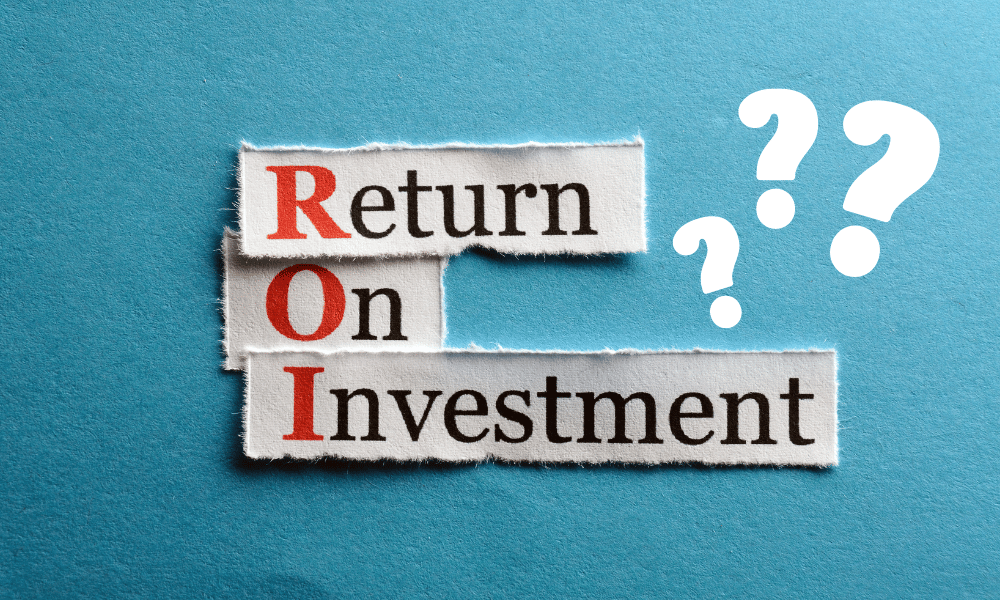Around 2010, I remember conversing with a client about content marketing. The business owner had spoken to several SEO “experts” who had pitched them some misnomers about effective marketing strategies. I had heard a million times that “if you have good SEO, you don’t need a copywriter,” and for a while, that was true. However, if you stop blogging, the results are detrimental to your business growth.
For a brief period, Google and other search engines didn’t scrutinize the quality of content. If you had a website and added content, you ranked! Some SEO agencies developed cheats, or “Black Hat” methods of gaming the search results.
Remember those ridiculous-looking keyword clouds you’d see in the widget section? Some websites added a paragraph of keywords at the bottom of a blog but colorized the font white so that readers could not see it (but search engines would award bonus points for the presence of those keywords when the page was crawled).
Since then, I have worked on triaging over one hundred different websites for content repair and recovery, and I know firsthand that bad things happen to your website when you stop blogging. I paused content marketing for my agency when I returned to corporate work for over four years, and I am rebuilding my traffic and domain authority now. It’s going to take some time and a lot of work.

The Google Panda Update Shook Things Up
Then came the Google Panda update in February of 2011. I like to refer to this update as the first nuclear sucker punch to SEO agencies. Suddenly, content mattered. You could buy or build all the backlinks you wanted, but you faced a significant SEO penalty if you didn’t have a blog and were passing off garbage quality content (with Black Hat tricks). The first of many updates that would follow was Google saying, “Content is King,” much to the surprise of SEO providers.
Do you know those SEO agencies with thousands of backlinks and low-quality (and sporadic) content? Nice domain authority! Impressive! However, buying backlinks is a no-no. Consider that another significant red flag that separates quality SEO agencies from the other types.
Over the past thirteen years, best practices for corporate DTC or B2B blogging have continued to evolve. My agency proliferated as I generated 30,000 and over 120,000 words of optimized monthly content. Everyone wanted content and needed “the good stuff” from experienced professionals. That strong demand for optimized, informative, helpful, and human-friendly content has remained.
With all due respect, if your current SEO provider debunks the value of corporate blogging and content marketing, you need a better provider. Consider that stance a red flag. Businesses must continually evaluate their expenditures against growth and profitability. Understandably, the value of content marketing is constantly scrutinized, which is why we wanted to share some insights to explain where the opportunities (and risks) lay when you deprioritize content marketing.

Why Some Businesses Stop Blogging and Question the ROI of Content Marketing
In our current inflationary climate, the cost of goods and services has increased so much that businesses are understandably looking for ways to cut costs. Content marketing can be expensive, and businesses sometimes wonder what would happen if they stop blogging.
One analogy I have shared is that reducing your investment in content marketing is like selling your tires while keeping your car. Sure, you have a little more money in your pocket, but your business isn’t going anywhere if you decide to nix spend on content strategy and production. Sales enablement happens with quality content marketing.
Difficulty Linking Blogs to Sales Enablement
The lines between sales and marketing are increasingly blurred. Sales teams want leads to convert into purchases and show revenue. That’s important because your business will be in big trouble if it doesn’t make money. However, sales cannot generate conversions and income in a silo by excluding marketing. Both sales and marketing have to work together to make revenue growth happen. I love working with sales professionals who understand the importance of content marketing. It shows me that they know what they are doing.
I’ve experienced the statement, “Blogs don’t make my business money,” which isn’t true. Of course, they want to offer landing page conversion, link building, internal and inbound links, and other services instead of prioritizing new content. No industry leaders debunk the benefits of blogging for businesses. Google it. 😉

Calculating The ROI Content Marketing
We understand linking blogs to sales conversions is problematic from a direct revenue perspective. Show me which blog made me $100k in sales this month! I can show you the blog that brought in 40,000 people (organic, unpaid traffic) to your website. We can show you the dates they first visited your website (and time of day), and that information can be correlated to aggregate sales statistics.
[Mic drop]We can also show you, via the Google Ads dashboard, how that one piece of content generated more traffic than some (or most) of your high CPC paid ads. While talking about CPC, what is the cost of spending thousands of dollars on Google Ads that get clicks and no conversions compared to the cost of producing a blog that generates 40k in organic traffic? Ads don’t give people a compelling enough reason to visit your website; content does. If you are invested in business blogging and have a successful blog, you recruit potential customers with relevant content. Every. Single. Day.
Professional bias aside, be skeptical of anyone saying you should stop blogging. They are generally pitching alternatives at a premium price that fails to deliver. Or they are someone who does not understand how digital marketing works. Conversions matter! They do not happen without quality content marketing. No matter what the sketchy SEO consultant (who has terrible quality blogs on their website) tells you.
Excellent SEO providers are content advocates. They love content professionals who get it right. When content marketing is on point, scaling search engine results, increasing website visitors, and optimizing conversion rates are much easier, and the business wins. It comes down to user experience. Brand awareness isn’t ambiguous; it’s critical to business growth and should be central to your marketing efforts.

Content Marketing Results From Corporate Blogging Are Not Immediate
If you research and segment target consumers (or businesses) using Google’s Audience Manager, create a Google Ad and launch it, you will start seeing results quickly. Running a search ad, for example, can take about 48 hours, and Performance Max ads take 2-3 weeks before they start delivering. The delay is a good thing. It’s called the “learning phase,” where Google analyzes your product, service, and the parameters of your audience segment(s) and then knocks it out of the park, providing outstanding results.
Assuming that the person you are working with is talented at placing Google Ads. Certified doesn’t mean skilled; a high CPC with low conversion is your red flag as a business owner. Skilled Google Ads professionals grind to lower the CPC where possible and are relentless about showing conversions. I know because I have worked with some of the best.
How Important Are Business Blogs For Website Traffic (And What Do Search Engines Want To See?)
Content marketing isn’t like that. You publish a blog, and then what happens? Your social media marketing team distributes it, and you share it with your customers in an email newsletter. That’s an SOP. Google and other search engines may take several hours to several weeks before they crawl your new blog post and index it.
How Quickly is Blog Content Crawled By Search Engines?
- Content Quality: Does it score high in terms of E-E-A-T? Is it optimized? Does it contain more than 20% AI-generated content? Poor-quality content is not a priority, so it takes longer for search engines to crawl and index it. Low-quality content is as appealing to search engines as three-day-old leftovers. Search engine optimization of valuable content is critical.
- Internal Links: They must be included in blog posts to provide a helpful user experience—not just your sales conversion pages. Within the blog content, link to related articles on the same topic that answer specific questions your customers have. Don’t underestimate the value of case studies.
- External Links: I worked with an optimization “expert” who argued that a blog should have no more than two links. He was wrong, and it stifled the website traffic potential of some of the content we produced (much to my chagrin). Outbound links are rocket fuel for traffic generation because they tick the box for engagement metrics. The rule of thumb is a) authority links, b) relevant links, and c) about 3-5 outbound links per 1,000 words. One of my most successful pieces of content achieved 100,000 unique, organic visits in thirty days (without ad support), and it was about 2,000 words in length with eight (8) authority outbound links. I checked in on it recently, and it is still a leading traffic-generating piece three years later, which is the result we always aim for when working for our clients.
- Timely Content: Writing short news pieces is a strategy that works. While those blogs do not have LTV (long-term value) as evergreen content, they expand your target audience reach and customer recruitment potential. The boost in online visibility (even for a short period of relevancy) is worth it.
The frequency with which you add new content to your blog also matters. Google and other search engines prioritize crawling websites that consistently add fresh content. Publishing 2-4 new high-quality content weekly provides the best results. It also gives your brand plenty of exciting content to share on social media.

Production of Quality Blogs Can Be Expensive
Every business that wants to succeed optimizes ROI. Those costs can add up quickly when generating high-quality content. That is usually where the question of value comes in, wondering what direct impact your blogs have on overall customer recruitment and sales.
Can you find writers that are economical to work with? Sure. Are they using AI to generate most of the content? That’s a problem. If you cannot tell the difference between high-quality content and copywriting for the sake of publishing words on your blogs, you will run into trouble. Quality costs money because it reflects the time, talent, and skill an expert content marketing professional offers.
Is that piece of content I wrote still generating tons of traffic for the company I used to work for? You bet it is. What has been the aggregate value of that piece over time? Hundreds of thousands have visited the website because of that single blog. High-quality, evergreen content has long-term value for your website. While there is no shortage of content writers, you get what you pay for.
When You Stop Blogging, Your Marketing Takes a Critical Hit
All the backlink building in the world won’t save (or grow) your website traffic if you stop blogging. Search engines are content aggregators, and it makes sense that they favor websites that constantly publish new and valuable information. I have watched a high-traffic website completely tank in less than a year after dropping the ball (and efforts) on sitewide content, which includes refreshing (and reoptimizing) landing page copy.
As a business owner balancing your cost and profit margins, you may wonder what the impact would be if you stopped blogging entirely. I have had conversations with many clients considering reallocating their budgets to activities they think will have the most significant and immediate impact on sales conversions. Sometimes, they believe they have enough content on their website to sustain their traffic (without the need to add more regularly).
Here is what starts to happen about thirty days after you stop prioritizing content marketing and blogging on your website:
1. Organic Search Traffic Starts To Drop
You may not notice significant changes for the first 1-2 months, so you may think the blog had a negligible impact on your traffic. Remember that search engine indexing takes time to crawl and evaluate your website. That latency applies when search engines determine that you’ve stopped or significantly slowed your content production. There are a few months of leeway given by Google and other search engines; they get that sometimes businesses may briefly pause. Maybe you lost your content provider or in-house writer(s). Search engines notice, but it doesn’t immediately reflect in your website metrics.
Then, you notice that blog traffic drops significantly. Once it becomes clear to Google and other search engines that you’ve stopped publishing, the organic search traffic starts to plummet quickly. You are no longer an active publisher, so your website is deprioritized. I’ve watched website traffic nosedive in as little as six months, and it can take several months of heavy publishing to recoup that loss because of latent indexing. It takes longer to recover than you think.
With all the competitive analytics software out there, your leading industry rivals will notice, too. One of the strategies I have repeatedly used is identifying competitors who have allowed their content marketing to slow or drop off. Then, I use tools like SEMrush to analyze their top-traffic landing pages and blogs, gather insights into their top-performing semantic clusters and keywords and write BETTER content for my business client.
Content marketing and SEO is an arms race. You will lose organic search traffic and give your competitors a window of opportunity to steal the show (and your existing and potential new customers). Once you lose your top spot for specific keywords and semantic term clusters, it can be challenging to regain it. Getting and weaponizing that data is effortless; your leading competitors monitor you monthly (sometimes weekly), looking for those opportunities.

2. Search Engine Rank Plummets
No one looks at page two of Google results; that can’t be overstated. Has your business worked hard to have several important URLS ranked on page one of search? You can expect to be replaced once your content marketing lags behind your competitors. Suddenly, those key customer and traffic-generating pages are no longer on page one; they slide to page four or ten.
When you don’t publish new content on your blog, your search results slide pretty quickly. Relying on evergreen content on your blog won’t save your page rankings either if you are not consistently updating it, checking for (and replacing) broken outbound or internal links, etc. Those broken links are deadly to your SEO. The competitors that continue with their assertive content marketing strategies will replace you, guaranteed, in search, as your site loses relevancy for not publishing new content.
3. CPC Starts To Increase on Paid Advertising
Did you know that deprioritizing content marketing will increase your cost-per-click (CPC) advertising costs? For example, Google Ads prioritize a Quality Score, which, in simple terms, is a grade on the quality of your website. One of the ways Google arrives at that quality score is to assess your website for relevancy compared to what your target audience is searching for online.
When you do not regularly refresh, update, and add new content to your website, its keyword relevancy starts to slide. For example, will people be talking about the Taylor Swift Eras Tour next year? Probably not. Trending keywords and search interests change quickly. Search engines will assess if your website has outdated information or content that no one is currently interested in. The operative word is “currently,” and old, outdated content and irrelevant keywords are not current. That means driving traffic to your website with Google Ads (and getting good results) will be more challenging, so they raise the CPC on your Google Ads.

4. Your Business Loses Relevancy to Existing Customers When You Stop Blogging
My perspective as a content strategist and digital marketer may differ from that of the average consumer. When I see a business that decided to stop blogging? I make a judgment about the company that isn’t positive. Are they still in business? The same holds for companies that significantly slow down (or stop) their social media activity. That brand or business appears less trustworthy, and I hesitate to buy their products or services.
It’s human nature to make a negative assumption when you see a business “go dark” on its digital marketing. Old content is boring. Even loyal customers will likely look to competitors actively producing fun, informative, and exciting content. Engagement is two-way; DTC and B2B brands who stop engaging lose customers. No one gets excited about engaging with a brand that becomes a veritable ghost town online. It is a deterrent if you stop blogging and posting on social.
What is your acquisition cost if you must work twice as hard to regain your customer base? Many businesses that pause their content marketing learn this the hard way and fight an uphill battle to retain existing customers and recruit new sales. Content marketing is critical not only to sales growth but to customer retention.
You Don’t Have to Stop Blogging: Reduce Your Content Costs
Outsourcing your content production can be affordable if hiring an in-house content team isn’t within your business’s budget. Our team at Social Me Multimedia specializes in providing economical content marketing services for small and mid-sized companies. We offer content marketing bundles for a flat fee, so you pay only for the services you need.
Isn’t that refreshing?
There is no annual retainer or hourly fees. We write all our client content in-house (we do not outsource) and work with brands to ensure you have top-quality content at affordable rates.
Schedule a free 15-minute meeting and consultation to discuss your content marketing needs.

